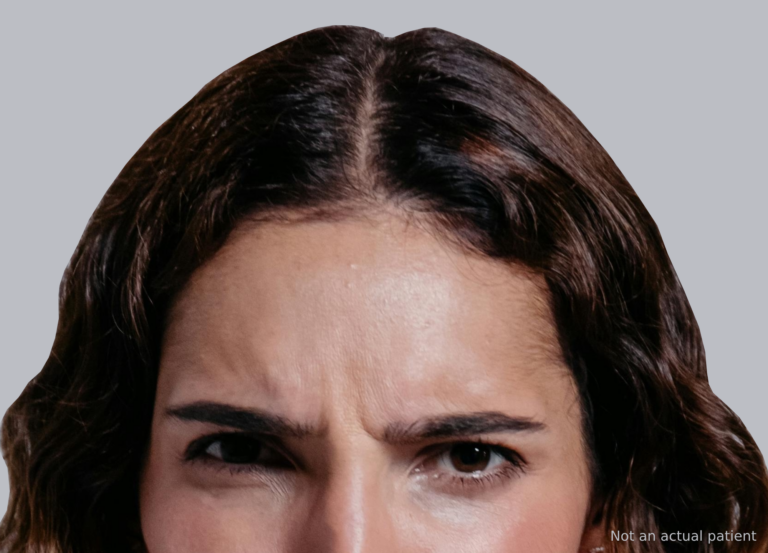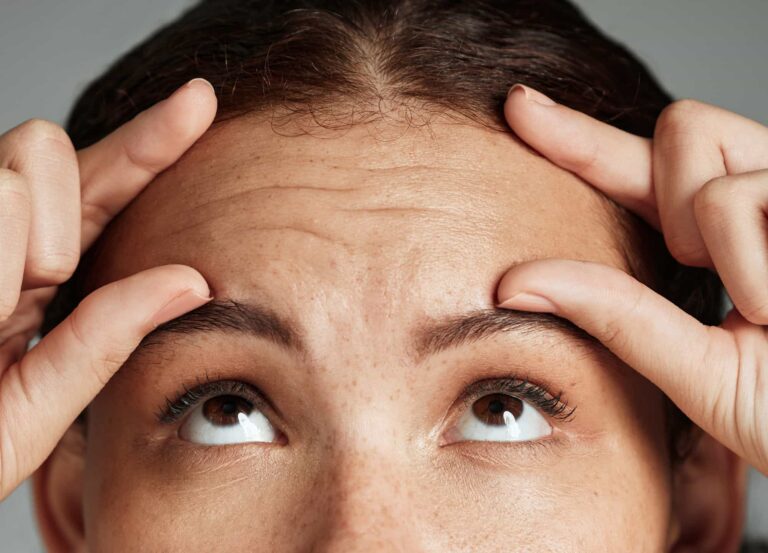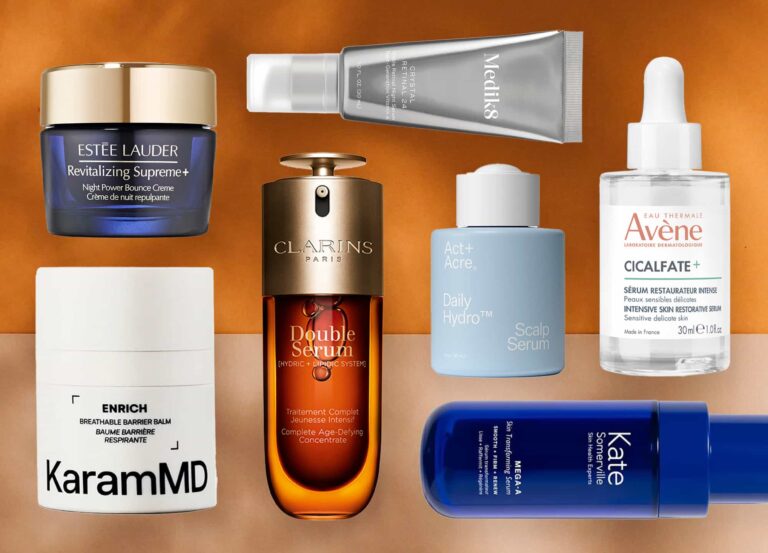Plastic surgeons are crediting ubiquitous WFH opportunities with an uptick in folks seeking downtime-heavy fixes during the pandemic. But for most of us, being able to keep a recovery under wraps doesn’t entirely assuage our post-op worries. We still tend to wonder, Will I be in pain? Will I be able to take care of myself? How long before I’ll look and feel “normal” again?
The facelift is a prime example of this—its invasiveness and on-display aftermath make the procedure especially daunting. Since no two people heal exactly the same, however, not even the most forthright and experienced surgeon—or exhaustive “facelift recovery” Google search—can 100% prepare us for what we’ll experience on the heels of this major surgery.
Hoping to shine a light on the unique nuances of the facelift post-op period, we asked three women to compare the expectations they had for their recovery (informed by their research and consultations) to the reality they confronted in the days and weeks after facelift surgery. These are their stories, edited for length and clarity.
Danielle’s facelift experience
Recovery expectations
My main concern about having a facelift was not looking like myself after surgery. I read a ton of reviews on RealSelf, did a lot of research, and even reached out to women who had previously had facelifts with my surgeon, Dr. Mark Karolak. I also consulted with two other plastic surgeons.
Still, I really wasn’t sure what to expect during recovery. I figured I’d feel sleepy and out of it and have some soreness or tightness, swelling, and bruising—but I wasn’t sure exactly how I was going to feel. I’ve always had a high pain tolerance, so I wasn’t too worried about that. Plus none of the patients I spoke with complained of severe pain—just more general discomfort or tenderness—and I was given prescriptions before the surgery for pain pills, antibiotics, and anti-nausea medicine. I knew there would be certain sleeping restrictions—I’d need to keep my head somewhat elevated, to avoid swelling—and exercise restrictions as well.
I didn’t line up any nursing care. Really, the only pre-op plan I made was to have my husband with me before and after surgery and to book our travel arrangements, since my surgeon was out of state. I took three weeks off from my full-time desk job.
Recovery reality
My surgery and recovery were seamless—everything really went well. I had my facelift done under local anesthesia, a cocktail of pills that made me sleepy plus numbing shots that I don’t even recall getting. I was initially worried that I’d feel tugging or pulling, but I never felt anything. I was awake and talking to the doctor for some of the surgery but definitely dozed off for the majority of the time. I remember the doctor telling me what he was doing. We chatted about Instagram and the two Real Housewives of New Jersey he had also performed facelifts on. I remember him telling me when I was almost done.
After the procedure, I was pretty alert. I had no real pain—just tenderness and some swelling and bruising in my neck and upper cheeks. The head wrap I had to wear was tight—that was probably the most annoying part. My husband says I slept a lot the remainder of the afternoon and the night after surgery. I took my pain medicine for the first two to three days, as a preventive measure.
I was able to be up on my own almost right away. I was careful and slow but didn’t require much assistance. I went out in public the day after surgery—I was swollen but overall felt good. By day three, I was socializing with my family. It was winter, so I wore a hat and was able to cover bruising—I really did not look bad—and I kept getting compliments on how supple my skin looked. I was puffy, but my skin looked really, really good.
Now, eight months out, I still have some numbness, but it’s getting better each day. —Danielle, 52, Winter Haven, Florida
Related: Is This Normal? Surgeons Spotlight 5 Facelift Recovery Concerns
Pamela’s facelift experience
Recovery expectations
I made it my main priority to find a highly skilled surgeon—and the only information I got about the surgery and recovery came directly from him. I intentionally did not research post-op information outside of my doctor’s instructions. So I really had no preconceived expectations—I wanted to turn a blind eye [to the particulars of the procedure] and just trust the process.
I had my prescriptions filled before the surgery. I took a four-week leave of absence from work. I asked a friend to drop me off and pick me up from surgery and to stay with me for a few hours after, and I also arranged for a neighbor, who is a retired nurse, to check on me.
Recovery reality
I spent the night at my surgeon’s surgical center. They kept me medicated from the time I went into surgery until an hour before I was to be picked up. When the [nurses] woke me after surgery, I was not in pain, but my head felt heavy. They put me in a wheelchair and washed my hair—it was bloody from the surgery, and I had drainage tubes and stitches behind my ears. Honestly, I was clueless that there would be a small screw in the top of my hairline. If I had really thought about the full extent of the surgery beforehand, I might not have gone through with it.
When my friend picked me up from the surgery center, I had a cooling mask on my face, but I could tell she was shocked by how extensive the surgery was. I had eyelid surgery and a laser procedure in addition to my facelift. But because I didn’t really know what was going to happen, I was not able to prepare her. Essentially, it felt like my ears had been taken off. My eyelids were so tight, they didn’t seal well—and my eyes were sensitive.
I rented a machine with a water-cooled face mask that I had to wear for the first four days to help with healing and swelling. I took Xanax, pain pills, and anti-nausea medication, and [I slept with my head] elevated in order to help the healing process. I knew that rest was critical to healing, so that’s what I did. My surgeon had a nurse visit my home for the first two days after I was discharged. My bathroom looked like a hospital room, with all the supplies and medications. I had to empty the drainage tubes behind my ears and monitor the discharge levels daily.
The most difficult part of my facelift recovery was the amount of time it took for me to feel like myself again. It was about two weeks before I wanted to go outside. The bruising and swelling were mostly gone by then. It was four weeks before I felt well enough to go back to work. And it was a full year before I felt like myself—but not for one minute have I regretted having my face, neck, and eyes done. I had never entertained the idea of Botox or fillers. For me, surgery was the only option for aging gracefully. I couldn’t be happier with the results and my surgeon. —Pamela, 60, Houston
Related: 11 Recovery Rules to Know Before Undergoing a Facelift
Zaiga’s facelift experience
Recovery expectations
I did all my research on YouTube—it was very informative, gaining information from surgeons and people who had been through facelift surgery. It prepared me for the post-op discomfort—“tightness” is how everyone describes it—and bruising and swelling. My only concerns were the nausea after surgery—which I always get with anesthesia—and the fact that I had decided, last minute, to get my eyelids done as well.
The plastic surgeon I chose was based in Prague, so my husband took a few days off, flew there with me for the operation, and escorted me back home to the U.K.
Recovery reality
I had my facelift operation on a Monday. The hospital looked after me 24/7 for the 48 hours I was there. The only thing I didn’t like was the sickness from the anesthesia—I wish there had been a way to prevent it. The first 24 hours after surgery were uncomfortable, mainly from the head bandage I had to wear. I actually thought there would be more pain, but there was only that uncomfortable tightness. Once the bandage was removed, it was much better. I was surprised by how good I looked—I had some slight bruising but nothing that would turn heads.
I took a few paracetamol [aka acetaminophen], along with antibiotics, the first day after surgery, and that was it. I found it very easy to move around after about 24 hours, and by 48 hours, I was washing my hair and feeling a lot better. When I left the hospital on Wednesday, I felt well enough for a little walk around Prague, which was lovely.
The most difficult part of my recovery was having the stitches out. The nurse who removed them in the U.K. didn’t know how many there were or what she was really looking for, as my surgeon in Prague used techniques she had not seen before. Still, it was a small price to pay; the cost of the operation in Prague was half of what it would’ve been in the UK.
My recovery didn’t really stop me from doing anything—except my regular workouts. For about four weeks post-op, I went on long daily walks, whereas I normally would have gone to the gym. I did have to wear a black head mask for a month, but with my being on lockdown, it didn’t affect me much. I was back at work two weeks after my operation.
I’m now four months down the line, and the healing process is still going well. I’m told that it’s nine months before you can see the full effect of facelift surgery. I am very happy with the outcome and would recommend it to all. —Zaiga, 52, Leicestershire, England











